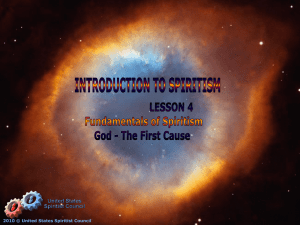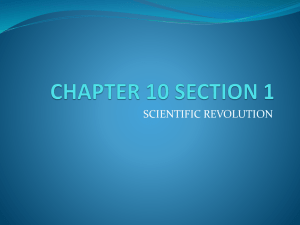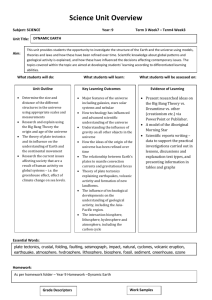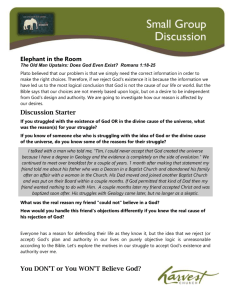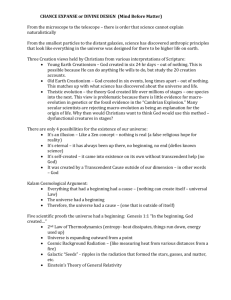God as Creator : from Theology and Sanity by Frank Sheed Why
advertisement
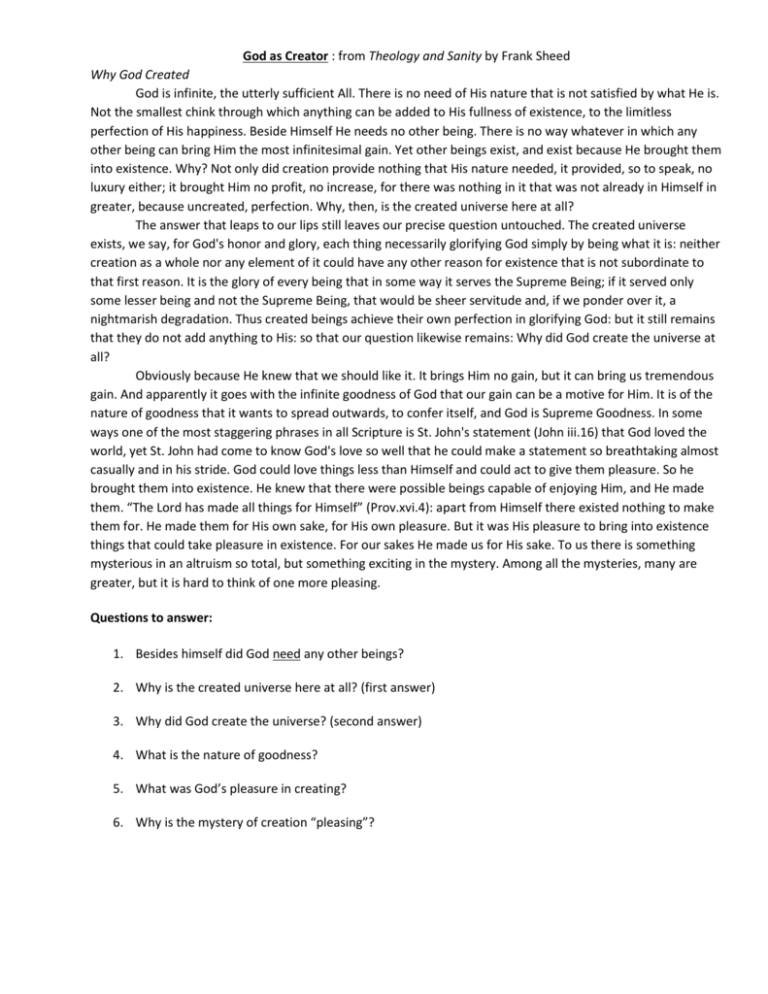
God as Creator : from Theology and Sanity by Frank Sheed Why God Created God is infinite, the utterly sufficient All. There is no need of His nature that is not satisfied by what He is. Not the smallest chink through which anything can be added to His fullness of existence, to the limitless perfection of His happiness. Beside Himself He needs no other being. There is no way whatever in which any other being can bring Him the most infinitesimal gain. Yet other beings exist, and exist because He brought them into existence. Why? Not only did creation provide nothing that His nature needed, it provided, so to speak, no luxury either; it brought Him no profit, no increase, for there was nothing in it that was not already in Himself in greater, because uncreated, perfection. Why, then, is the created universe here at all? The answer that leaps to our lips still leaves our precise question untouched. The created universe exists, we say, for God's honor and glory, each thing necessarily glorifying God simply by being what it is: neither creation as a whole nor any element of it could have any other reason for existence that is not subordinate to that first reason. It is the glory of every being that in some way it serves the Supreme Being; if it served only some lesser being and not the Supreme Being, that would be sheer servitude and, if we ponder over it, a nightmarish degradation. Thus created beings achieve their own perfection in glorifying God: but it still remains that they do not add anything to His: so that our question likewise remains: Why did God create the universe at all? Obviously because He knew that we should like it. It brings Him no gain, but it can bring us tremendous gain. And apparently it goes with the infinite goodness of God that our gain can be a motive for Him. It is of the nature of goodness that it wants to spread outwards, to confer itself, and God is Supreme Goodness. In some ways one of the most staggering phrases in all Scripture is St. John's statement (John iii.16) that God loved the world, yet St. John had come to know God's love so well that he could make a statement so breathtaking almost casually and in his stride. God could love things less than Himself and could act to give them pleasure. So he brought them into existence. He knew that there were possible beings capable of enjoying Him, and He made them. “The Lord has made all things for Himself” (Prov.xvi.4): apart from Himself there existed nothing to make them for. He made them for His own sake, for His own pleasure. But it was His pleasure to bring into existence things that could take pleasure in existence. For our sakes He made us for His sake. To us there is something mysterious in an altruism so total, but something exciting in the mystery. Among all the mysteries, many are greater, but it is hard to think of one more pleasing. Questions to answer: 1. Besides himself did God need any other beings? 2. Why is the created universe here at all? (first answer) 3. Why did God create the universe? (second answer) 4. What is the nature of goodness? 5. What was God’s pleasure in creating? 6. Why is the mystery of creation “pleasing”? What it means to be created We have thus caught some glimpse of why the created universe exists. That must always be the primary question. Until we know WHY a thing exists, we cannot properly know anything else about it. Whatever details we can discover by studying it, our interpretation of the details must always be governed by our understanding of WHY THE THING EXISTS AT ALL. If we are wrong about that, the details we do know are as likely to mislead us as not. But if WHY is the primary question and its answer the key to all knowledge, there are other questions to be answered in due order. The question WHY is followed by the question HOW? The universe exists because God loved the very idea of it. But how did the universe come into existence? This, of course, is not at all the same as the scientist's question about the origin of the universe. Science always starts with something in existence, and its efforts to explain the origin of that something simply mean looking for some earlier something of the same created order. This study is of immense value, but our present inquiry undercuts it. Quite simply we are asking how is it that anything is here at all. When philosophers and theologians ask why anything exists, the alternative they have in mind is nothing. There might have been nothing, why is there something? This is a question that quite properly science does not put. If in his backward progress from cause to earlier cause the scientist suddenly found himself faced with nothing, he would be inexpressibly startled. Neither his instruments nor his scientific methods are made to cope with nothing. If he found nothing in his series he would have to call upon philosophy and theology. But a question is nonetheless a question and none the less urgent because science cannot cope with it. If one may venture a criticism of the scientists one meets, one does sometimes feel that they have a tendency to treat questions which science cannot handle as if they were by that very fact not questions at all. But the question how anything exists is second only in importance to the question why anything exists; and we must consider both in the light of philosophy and theology, which can answer them, not blaming science because it cannot, but not treating the questions as unimportant because it cannot. We have seen why God exists: He exists because what He is demands existence, cannot not-exist. But this created universe does not thus demand existence. How then does it exist? It can exist only because God, Who alone possesses existence as of right, confers existence upon it. God made it. And He made it of nothing. What else was there for Him to make it of? He could not make it of Himself, for He is utterly simple and changeless: there are no parts in Him that could be subtracted from Him and set going as a universe that was not He. In one sense, then, the act of creation can be stated quite simply. God willed that things that had not been should be. He spoke and they were made; “He commanded and they were created” (Ps.cxlviii.5). To create is to make a thing in its totality, that is, to make the whole of it. A carpenter does not make the whole of a chair the wood is not of his making; a poet does not make the whole of a poem, the words already existed; but God does make the whole universe, there is nothing in it that is not of His making, nothing that already existed. We must not misunderstand the statement that God made the universe of nothing. It does not mean that God used nothing as a kind of material that He proceeded to shape into a universe. It means that God used no material whatever in the making of the universe. That He could do this goes with His infinity. We have some faint glimpse of what this means when we see a human agent in action. It is the measure of human power to be able to make a little go a long way. It is the measurelessness of infinite power that it can make a universe with no material at all. If we honestly focus our minds upon the act of creation, really and honestly consider what making something out of nothing means, we find it almost totally baffling. The mind seems unable to see anything at all. But this is not that the mind is blinded by sheer darkness, but dazed both by too much light and by its own lack of habituation to moving by its own strength. Upon the act of creation our habit of relying upon the imagination lets us down most evilly. We think we are THINKING about the production of something from nothing by infinite power, whereas in fact we are trying desperately to FORM SOME MENTAL PICTURE of the process. Such an attempt is forever doomed to failure, because one of the terms in the process, nothingness, has no image. If we are to come to any understanding at all of creation we must insist that our mind handle the concepts concerned, without the distraction of trying to picture them. And the concepts concerned are very simple. God is infinite. There is no limitation to His being, there is no limitation to His power. Because there is no limitation to His power, there is no limitation to His power of making. But it would be a great limitation to his power of making if it needed material to work upon. God does not need things at all; He is not dependent upon them in any way whatever. We have already seen (chapter iv) that God does not depend upon things for His knowledge of things: As St. Augustine says (De Genesi ad Litteram): “He made the things He knew: He did not get to know the things He had made.” His power of making is as independent of created things as His power of knowing. The most skilful carpenter is dependent upon the wood, and without it would be a very helpless carpenter, sitting with folded hands and all his skill within him. But that would be a very meager figure for the omnipotent God. “He can send His call to that which has no being as if it already was” (Rom.iv.17). This fact that God made us and all things of nothing by a sheer act of His will, is not simply a fact of history, something that happened an immeasurably long time ago. We may very well think of it as something that happened, because it did happen. But it implies as its corollary something that is happening here and now, happening from instant to instant and of the most vital importance to us. BECAUSE GOD MAKES US OF NOTHING, THEN WE CANNOT CONTINUE IN EXISTENCE UNLESS GOD CONTINUOUSLY HOLDS US IN EXISTENCE. There is an emptiness at the centre of the being of every created thing, which only God can fill; not an emptiness merely in the sense that it cannot be happy without God; but in the sense that it cannot be at all without Him. God does not simply make us and leave us. To return for a moment to the carpenter: he can make a table and leave it and the table will continue, none the worse for his absence. But that, as we saw in chapter I, is because of the material he used, namely wood. Wood is so constituted that it will retain a shape given to it. Similarly, if God, having made the universe, left it, the universe would have to rely for its continuance in existence upon the material it was made of: namely nothing. Questions to answer: 1. Why is the primary question we have to ask “why did God create the world”? 2. What question follows “why the universe was created”? 3. What is the difference between a scientist and a theologian asking the question of “how”? 4. What criticism of scientists does Sheed offer? 5. What is it that God alone possesses but gives to the world? 6. What does “to create” mean? 7. Why does a carpenter not “create” a chair? 8. Is “nothing” a kind of material? 9. Why are our desperate attempts to imagine the process by which God created out of nothing “doomed to failure”? 10. Which attribute of God corresponds to his power of making? 11. We cannot continue to exist unless… 12. What would happen if God made the universe and then left it?


